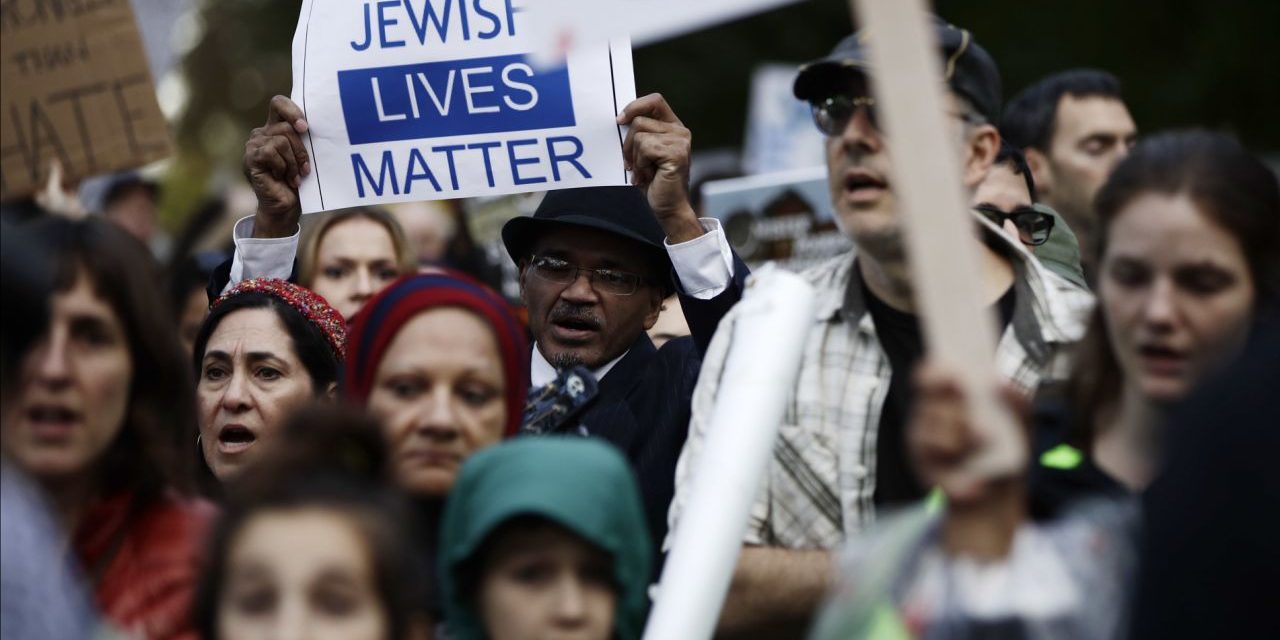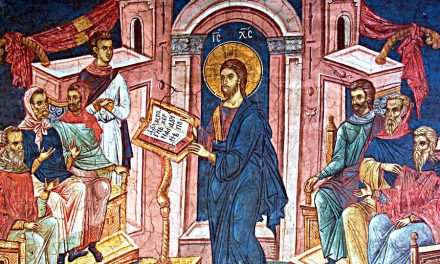DT 6:2-6; HEB 7:23-28; MK 12:28B-34
Hear, O Israel!
The Lord our God is Lord alone!
You shall love the Lord your God with all your heart,
with all your soul,
with all your mind,
and with all your strength.
These words — the first commandment given by the Lord, the initiation of the covenant — these words ring out in both the first reading and the Gospel for this week. They tell us to approach God with a single-minded focus. This is all the more important to take to heart this week as we mourn the massacre at the Tree of Life Synagogue this week, an act of violence wrought by the placement of White Nationalism as a new god, a golden calf worshiped in a world that fails to keep this first, most central commandment.
The text from Deut 6:4, also known as the Sh’ma Yisrael, holds a special place in Jewish prayer and liturgy, being a part of daily prayer dating back to the Babylonian exile. Each word carries weight and significance, reflected upon in a long history of rabbinic interpretations.
Sh’ma — listen, or hear and do.
The moment I heard of the killings at the Tree of Life Synagogue, I felt overwhelmed with a familiar feeling. It was the same heart-brokenness I felt when I heard about Charleston. The same heavy sadness of Charlottesville. The knowledge that once again, White Nationalism had seized a bloody victory. It is all too tempting to draw a line around the Dylan Roofs, the Robert Bowers of the world and call them aberrations. These men who placed white supremacy in the place of God, these men who let fear and anger take over their souls and minds with all their strength — they are abnormal. *I* am not like that, we reassure ourselves, neither are my friends. If such men are so rare, then we can relieve ourselves of the burden of protecting the vulnerable. Who could predict sure rarified anger?
Nonetheless, the number of events that I can name show it is not rarefied, and yes, White Nationalism is that common. They gathered in crowds at Charlottesville. We need only listen to the world around us, to fear mongering about caravans and the 57% rise in anti-Semitic incidents, to see that we are called action, to hear and do something.
Yisrael.
I tell my students, my friends, my family: God keeps God’s promises. Israel remains those who are chosen.
As a Christian, I am blessed only because I have been grafted onto that tree whose roots began with Abraham. There is no Christianity without Israel; and so we Christians hold a special obligation to not only combat antisemitism, but prune the poison of it out of our theology. Every time I hear a Gospel where Jesus debates with Pharisees, I tense up: will the homily lazily fall back on old combative tropes? Will it use “Pharisaical” as a pejorative?
And this week, will we hear Israel, will we hear “Tree of Life” and “antisemitism” in our homilies? Will our pastors lament alongside Pittsburgh? Or will they be too fearful of alienating Christians made uncomfortable by talk of politics and division?
The divisions will not go away if we ignore them.
Adonai — The Lord (in place of the Tetragrammaton).
We call upon the Lord; we are called to the Lord. We ought to remember that this covenantal command was given at a time of great upheaval among Israel. Freed from Egypt, yes, but they did not yet know what was to come: the wandering, the fighting, the bloodshed, exiles, subjugation. Being the chosen people was no easy task.
And yet, we are called to the Lord. We cannot love God with all we have and expect anything other than conflict: time and again Scripture shows us that painful truth. In a world that wants us to worship the golden calf, that places White Nationalism in the foreground, we must expect that staying faithful to the Lord comes with challenge and strife.
Eloheinu — our God.
Are we prepared to look at the Lord, to love the Lord, and in that love recognize our own complicity in antisemitism, in fearing outsiders, in an unwillingness to welcome the refugee? A desire to claim God only for ourselves, and only for our own self-interest?
Many who would deny their antisemitism today would still reject the refugees on our border tomorrow. This is not the first time that American Christians have placed their country’s borders before God. That misplaced priority also led to the rejection of Jewish refugees from Europe half a century ago. It is not an accident that Bowers collapsed the unfounded fears of the immigrant caravan into his antisemitism. In a world where Christians have driven the Jewish people out of home after home after home, their history becomes a history of exile, refuge, persecution, and exile, again – an ongoing cycle.
And sometimes, the problem is not about placing politics before God, but about creating borders in our theology. The Sh’ma speaks of “our God” – a shared God. Not an American God. Not a God of countries. A God of a chosen people, with whom Christians are invited to share. Instead, our theology has sought to possess the Lord for Christianity alone. This is the sin all Christians must repent of, lament, and decry. This is the sin that makes an action like Bowers’s possible.
Echad — one.
Together, there is one God we worship.
In Mark’s gospel, the young Jewish scribe that asked Jesus the question (“Which is the first of all the commandments?”) is commended by Jesus for his love of the Lord. The scribe knows the importance of this command, and states that it is more important than “burnt offerings and sacrifices.” Jesus tells him that “You are not far from the kingdom” because of it. Jesus saw into this young man’s heart, saw the Sh’ma Yisrael alive within it. May we, too, learn the importance of this commandment and let the actions of our hearts testify to it.



